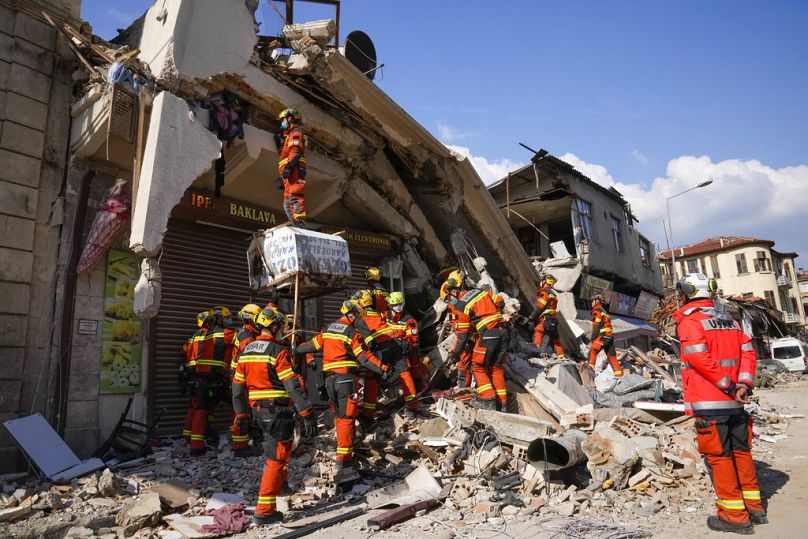Rescue teams have found a dozen people alive in Turkey, five days after buildings were flattened in parts of the country, and in neighbouring Syria, in Monday's earthquake. Field hospitals have been set up to treat the injured and mass graves are being dug in the worst hit areas.
The death toll in Monday’s earthquake in Turkey and Syria has passed 28,000.
Rescuers are still finding people alive five days later, but mass graves are also being prepared, while temporary field hospitals, some run by international aid groups and military response teams, are treating some of the injured.
In Turkey, a father and his three-year-old daughter were pulled from the debris in Islahiye, Gaziantep province, after surviving for 132 hours.
Not everything ended so well, however. Rescuers reached a 13-year-old girl inside the debris of a collapsed building in Hatay province early on Saturday and intubated her. But she died before the medical teams could amputate a limb and free her from the rubble, Hurriyet newspaper reported.
Indian army field hospital
As aid continued to arrive, a 99-member group from the Indian Army’s medical assistance team began treating the injured in a temporary field hospital in the southern city of Iskenderun, where a main hospital was demolished.
One man, Sukru Canbulat, was wheeled into the hospital in a wheelchair, his left leg badly injured with deep bruising, contusions and lacerations.
Wincing in pain, he said he had been rescued from his collapsed apartment building in the nearby city of Antakya within hours of the quake on Monday. But after receiving basic first aid, he was released without getting proper treatment for his injuries.
He said: “I buried (everyone that I lost), then I came here. My daughter is dead, my sibling died, my aunt and her daughter died, and the wife of her son who was eight and a half months pregnant.”
Makeshift graveyard
A large makeshift graveyard was under construction on the outskirts of Antakya on Saturday. Backhoes and bulldozers dug pits in the field on the northeastern edge of the city as trucks and ambulances loaded with black body bags arrived continuously. Soldiers directing traffic on the busy adjacent road warned motorists not to take photographs.
The hundreds of graves, spaced no more than a metre apart, were marked with simple wooden planks set vertically in the ground.
A worker with Turkey’s Ministry of Religious Affairs, who did not wish to be identified because of orders not to share information with the media, said that around 800 bodies were brought to the cemetery on Friday, its first day of operation. By midday on Saturday, he said, as many as 2,000 had been buried.
“People who are coming out from the rubble now, it’s a miracle if they survive. Most of the people that come out now are dead, and they come here,” he said.
Temperatures remained below freezing across the large region, and many people have no shelter. The Turkish government has distributed millions of hot meals, as well as tents and blankets.
Turkish President Recep Tayyip Erdogan
Turkish President Recep Tayyip Erdogan, visiting quake-stricken Diyarbakir, said universities would switch to long-distance education until the summer, to free up state-run dormitories for survivors left homeless.
In the city of Kahramanmaras, where a stadium was turned into a makeshift camp, survivors walked among hundreds of tents, queued for hot meals and huddled around campfires.
In Antakya, an international charity helping Syrian refugees in Turkey has offered shelter to dozens in the grounds of an intact building on the city's edge.
“The problem is there is not a single home that is inhabitable in Antakya, so the only shelter is the street,” said Ahmed Abou el-Shaar, founder of the Molham charity.
The disaster compounded suffering in a region beset by Syria’s 12-year civil war, which has displaced millions of people within the country and left them dependent on aid. The fighting sent millions more to seek refuge in Turkey.
The conflict has isolated many areas of Syria and complicated efforts to get aid in. The UN refugee agency estimated that as many as 5.3 million people have been left homeless in Syria.
Syrian state TV said Assad and his wife Asma on Saturday morning visited Duha Nurallah, 60, and her son Ibrahim Zakariya, 22, who were pulled out of rubble the night before in the nearby coastal town of Jableh.
World Health Organization
The head of the World Health Organization, Tedros Adhanom Ghebreyesus, arrived in Syria’s northern city of Aleppo on Saturday, bringing with him 35 tons of medical equipment, state news agency SANA reported. He said another plane carrying an additional 30 tons of medical equipment will arrive in the coming days.
The opposition Syrian Civil Defence, also known as White Helmets, said Saturday that it “is almost impossible to find people alive”.
The death toll in Syria's northwestern rebel-held region has reached 2,166, many of them women and children. The total number of dead in Syria was 3,533, while in Turkey, officials counted 24,617 dead through Saturday.












